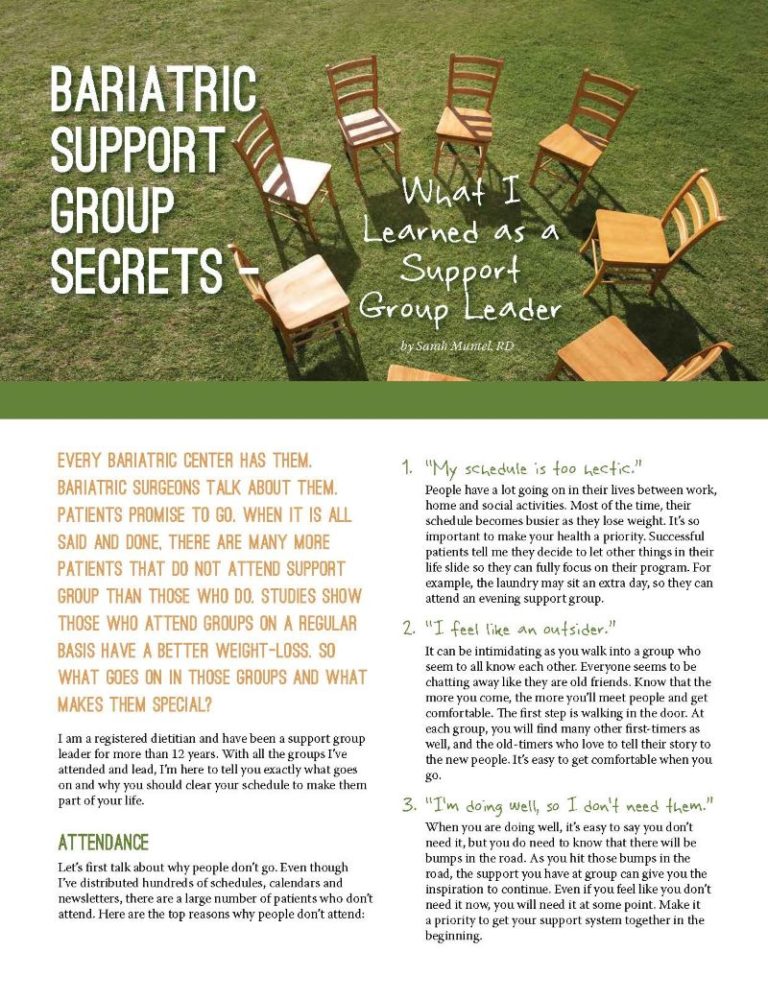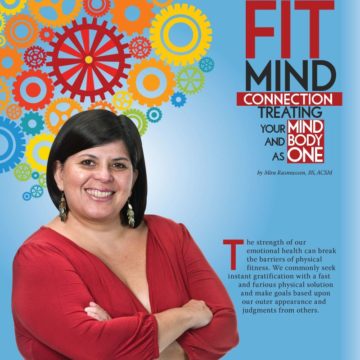Bariatric Support Group Secrets – What I Learned as a Support Group Leader


by Sarah Muntel, RD
Summer 2013
Every bariatric center has them. Bariatric surgeons talk about them. Patients promise to go. When it is all said and done, there are many more patients that do not attend support group than those who do. Studies show those who attend groups on a regular basis have a better weight-loss. So what goes on in those groups and what makes them special?
I am a registered dietitian and have been a support group leader for more than 12 years. With all the groups I’ve attended and lead, I’m here to tell you exactly what goes on and why you should clear your schedule to make them part of your life.
Attendance
Let’s first talk about why people don’t go. Even though I’ve distributed hundreds of schedules, calendars and newsletters, there are a large number of patients who don’t attend. Here are the top reasons why people don’t attend:
1. “My schedule is too hectic.”
People have a lot going on in their lives between work, home and social activities. Most of the time, their schedule becomes busier as they lose weight. It’s so important to make your health a priority. Successful patients tell me they decide to let other things in their life slide so they can fully focus on their program. For example, the laundry may sit an extra day, so they can attend an evening support group.
2. “I feel like an outsider.”
It can be intimidating as you walk into a group who seem to all know each other. Everyone seems to be chatting away like they are old friends. Know that the more you come, the more you’ll meet people and get comfortable. The first step is walking in the door. At each group, you will find many other first-timers as well, and the old-timers who love to tell their story to the new people. It’s easy to get comfortable when you go.
3. “I’m doing well, so I don’t need them.”
When you are doing well, it’s easy to say you don’t need it, but you do need to know that there will be bumps in the road. As you hit those bumps in the road, the support you have at group can give you the inspiration to continue. Even if you feel like you don’t need it now, you will need it at some point. Make it a priority to get your support system together in the beginning.
Relationships
My favorite part of support group is the patient relationships that form. Most people have support at home with family or friends, which is great. There is a difference between that support and the support you get from someone who’s been in the same situation you are in with weight. The bonds people form at group are strong. When you see the same people week after week, you become friends. Many feel so connected they stand and talk in the parking lot for more than an hour when group is over or arrange to get together and walk or shop during the week.
Sometimes relationships change after surgery. New friends can easily be found at support group. There is something to be said about connecting with someone who is in the exact same situation you are.
Safety
Support groups offer a “safe place.” Support group is a place where anything goes and you aren’t judged. Patients feel like they can openly talk about what’s going on in their life and what they’re struggling with. Recently at a support group, the topic went to the discussion of being off track. Patients were able to share their struggles. So many people had the same struggles. The ones who weren’t struggling were able to offer support. In a room full of 20 to 30 post-op patients, you can get great ideas and suggestions that have all worked for them in the past.
As a group leader, sometimes I feel like I only need to sit and observe as one person tells another to stop making poor food choices or take their calcium every day. The next time they see each other, they ask how they’ve been doing making the changes they talked about the previous week.
Education
Support groups can offer education. Bariatric surgery can be like a foreign language when you start. There is so much to learn! You can’t possibly soak it all up in your follow-up appointments. Many groups are education-focused where you can learn about food choices, meal plans, vitamins and fluid guidelines. For those patients who think they know all the basics, remember, bariatric surgery is a growing field. As surgeries change and research is found, recommendations change. Patients who attend are aware of the newest up-to-date recommendations. Throughout the years, meal plans and vitamin recommendations change. This information is vital for health, and coming to group assures you get the latest information.
At Support group, you learn the tricks that you don’t learn in the books. There are books about bariatric surgery and health professionals that also help you along the road. All of this is very important information. Support group can offer you ideas not found in the book. Patients share tricks that work for them. For example, at support group, you can learn what the best tasting protein supplement is, where to buy your calcium citrate and how you really feel after surgery. The things you hear at group are things you don’t hear from the professionals but are invaluable.
Conclusion
Support group is a time during the week that you think about your surgery and your progress. Life is busy and people get overwhelmed with work, kids and other commitments. Sometimes your surgery and your program take a backseat. When your surgery takes a backseat, your program can slip. Coming to support group can give you a shot in the arm and you will become refocused. Some patients say support group is like going to church!
Make it your mission this month to try a group out, and see what you think. I believe your success depends on it, and I’m pretty sure once you go, you’ll keep coming back to it.
About the Author:
Sarah Muntel, RD, is a registered dietitian with IU Health Bariatric & Medical Weight-loss. She has worked in bariatrics for the past 12 years and enjoys helping people get to a healthy weight so they can improve their health, feel better about themselves and become more active.
by Kendall Griffey, OAC Communications Manager Spring 2024 We have officially kicked off Your Weight Matters Regional…
Read Articleby Robyn Pashby, PhD Winter 2024 “No one is ever going to date you if you don’t…
Read Articleby Kendall Griffey, OAC Communications Coordinator Winter 2024 The Obesity Action Coalition’s 12th annual Your Weight Matters…
Read Article








